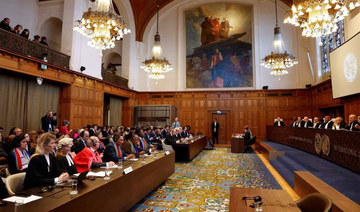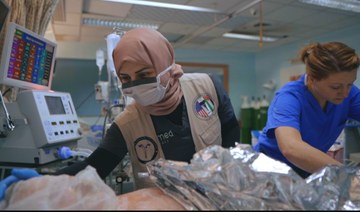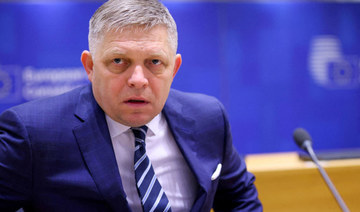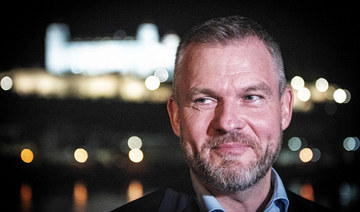KYIV, Ukraine: Melodic Colombian Spanish fills a hospital treating soldiers wounded fighting Russian forces in eastern Ukraine.
Ukraine’s ranks are depleted by two years of war. As it battles the Russian war machine, Ukraine is welcoming hardened fighters from one of the world’s longest-running conflicts.
Professional soldiers from Colombia bolster the ranks of volunteers from around the world who have answered Ukrainian President Volodymyr Zelensky’s call for foreign fighters to join his nation’s war with Russia.
A 32-year-old from the city of Medellin was trying to save a colleague wounded in three days of heavy fighting with Russian forces. Russian drones attacked the group and shrapnel from a grenade dropped by one pierced his jawbone.
“I thought I was going to die,” said the man, who goes by the call sign Checho. The fighters insisted on being identified by their military call signs because they feared for their safety and that of their families.
“We got up and decided to run away from the position to save our lives,” Checho said. “There was nowhere to hide.”
Colombia’s military has been fighting drug-trafficking cartels and rebel groups for decades, making its soldiers some of the world’s most experienced.
With a military of 250,000, Colombia has Latin America’s second-largest army, after Brazil’s. More than 10,000 retire each year. And hundreds are heading to fight in Ukraine, where many make four times as much as experienced non-commissioned officers earn in Colombia, or even more.
“Colombia has a large army with highly trained personnel but the pay isn’t great when you compare it to other militaries,” said Andrés Macías of Bogota’s Externado University, who studies Colombian work for military contractors around the world.
Retired Colombian soldiers began to head overseas in the early 2000s to work for US military contractors protecting infrastructure including oil wells in Iraq. Retired members of Colombia’s military have also been hired as trainers in the United Arab Emirates and joined in Yemen’s battle against Iran-backed Houthi rebels.
Colombia’s role as a recruiting ground for the global security industry also has its murkier, mercenary corners: Two Colombians were killed and 18 were arrested after they were accused of taking part in the assassination of Haitian President Jovenel Moïse.
At the military hospital normally treating wounded Ukrainian soldiers, a group of about 50 Colombian fighters spend most of their time staring at their phone screens — calling home, browsing the Internet and listening to music in between meals and medical procedures, most for light injuries.
As the two-year mark in the war approaches, Ukraine’s forces are in a stalemate with Russia’s. Ukraine is now expanding its system allowing people from around the world to join the army, said Oleksandr Shahuri, an officer of the Department of Coordination of Foreigners in the Armed Forces of Ukraine.
In early 2022, authorities said 20,000 people from 52 countries were in Ukraine. Now, in keeping with the secrecy surrounding any military numbers, authorities will not say how many are on the battlefield but they do say fighters’ profile has changed.
The first waves of volunteers came mostly from post-Soviet or English-speaking countries. Speaking Russian or English made it easier for them to integrate into Ukraine’s military, Shahuri said.
Last year the military developed an infrastructure of Spanish-speaking recruiters, instructors and junior operational officers, he added.
Hector Bernal, a retired ex-combat medic who runs a center for tactical medicine outside Bogota, says that in the last eight months he’s trained more than 20 Colombians who went on to fight in Ukraine.
“They’re like the Latin American migrants who go to the US in search of a better future,” Bernal said. “These are not volunteers who want to defend another country’s flag. They are simply motivated by economic need.”
While generals in Colombia get around $6,000 a month in salaries and bonuses, the same as a government minister, the rank and file gets by on a much more modest income.
Corporals in Colombia get a basic salary of around $400 a month, while experienced drill sergeants can earn up to $900. Colombia’s monthly minimum wage is currently $330.
In Ukraine any member of the armed forces, regardless of citizenship, is entitled to a monthly salary of up to $3,300, depending on their rank and type of service. They are also entitled to up to $28,660 if they are injured, depending on the severity of the wounds. If they are killed in action, their families are due $400,000 compensation.
Checho says principle drove him to travel to Kyiv last September. He estimates that in his unit alone, there were around 100 other fighters from Colombia who had made the same journey.
“I know that there are not many of us, but we try to give the most we have in order to make things happen and to see a change as soon as possible,” he said.
In Colombia, word about recruitment to the Ukrainian army spreads mostly through social media. Some of the volunteers who already fight in Ukraine share insights on the recruitment process on platforms such as TikTok or WhatsApp.
But when something goes wrong, getting information about their loved ones is hard for relatives.
Diego Espitia lost contact with his cousin Oscar Triana after Triana joined the Ukrainian army in August 2023. Six weeks later, the retired soldier from Bogota stopped posting updates on social media.
With no Ukrainian embassy in Bogota, Triana’s family reached out for information from the Ukrainian embassy in Peru and the Colombian consulate in Poland — the last country Triana passed through on his way into Ukraine. Neither responded.
“We want the authorities in both countries to give us information about what happened, to respond to our emails. That is what we are demanding now,” Espitia said.
The Associated Press tracked down a Colombian fighter who uses the call sign Oso Polar — Polar Bear — and says he was the last person to see Triana alive on October 8, 2023. He says Triana’s unit was ambushed by Russian forces in the Kharkiv region, after which his fate was unknown.
The Ukrainian military unit where Triana was serving confirmed to The Associated Press that Triana is officially missing, but would not disclose any details surrounding the circumstances in which he disappeared.
Espitia, his cousin, says he’s not sure what motivated Triana to fight in Ukraine. But the 43-year-old had served in the Colombian army for more than 20 years and leaving it had been “mentally difficult,” Espitia said.
“It could’ve been for the money, or because he missed the adrenaline of being in combat. But he didn’t open up very much about his reasons for going,” Espitia said.
After almost three weeks in the hospital, Checho has returned to Ukraine’s front line. So have more than 50 other Colombian fighters who were treated in the same facility.
“The situation here is hard,” Checho told AP. “We are under constant bombardment, but we will keep fighting.”
Ukraine needs more troops to fight Russia. Hardened professionals from Colombia are helping
https://arab.news/vkj2s
Ukraine needs more troops to fight Russia. Hardened professionals from Colombia are helping
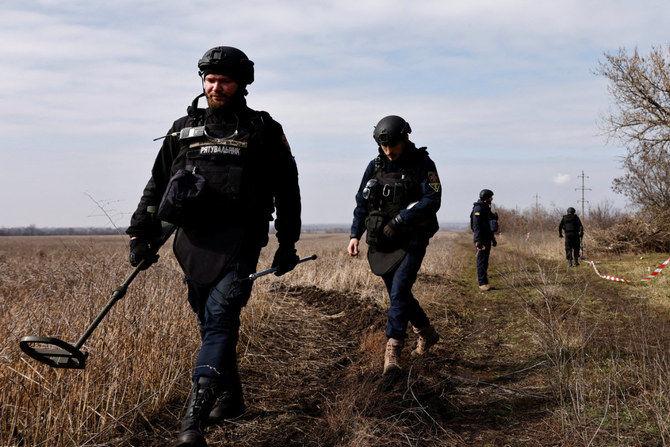
Russia’s Putin arrives in China for state visit in a show of unity between the authoritarian allies

- On the eve of the visit, Putin told Chinese media that the Kremlin is prepared to negotiate over the conflict in Ukraine
- Ukrainian president has said any negotiations must include a restoration of Ukraine’s territorial integrity and withdrawal of Russian troops
BEIJING: Russia’s President Vladimir Putin landed Thursday in Beijing for a two-day state visit to China, in a show of unity between the authoritarian allies as Moscow presses forward with a new offensive in Ukraine.
Putin’s visit comes as Russia has become more economically dependent on China following Moscow’s full-scale invasion of Ukraine more than two years ago.
On the eve of the visit, Putin said in an interview with Chinese media that the Kremlin is prepared to negotiate over the conflict in Ukraine. “We are open to a dialogue on Ukraine, but such negotiations must take into account the interests of all countries involved in the conflict, including ours,” Putin was quoted as saying by the official Xinhua News Agency.
The Russian leader’s two-day trip comes as his country’s forces have pressed an offensive in northeastern Ukraine’s Kharkiv region that began last week in the most significant border incursion since the full-scale invasion began, forcing almost 8,000 people to flee their homes.
Along with Moscow’s efforts to build on its gains in the nearby Donetsk region, the 2-year-old war has entered a critical stage for Ukraine’s depleted military that is awaiting new supplies of anti-aircraft missiles and artillery shells from the United States.
“We have never refused to negotiate,” Putin was quoted as saying by Xinhua. “We are seeking a comprehensive, sustainable and just settlement of this conflict through peaceful means. We are open to a dialogue on Ukraine, but such negotiations must take into account the interests of all countries involved in the conflict, including ours.”
Ukrainian President Volodymyr Zelensky has said any negotiations must include a restoration of Ukraine’s territorial integrity, the withdrawal of Russian troops, the release of all prisoners, a tribunal for those responsible for the aggression, and security guarantees for Ukraine.
China claims to take a neutral position in the conflict, but has backed Moscow’s contentions that Russia was provoked into attacking Ukraine by the West, despite Putin’s public avowals of his desire to restore Russia’s century-old borders as the reason for his assault.
Putin has blamed the West for the failure of negotiations in the opening weeks of the war and praised China’s peace plan for Ukraine that would allow Moscow to cement its territorial gains.
“Beijing proposes practicable and constructive steps to achieve peace by refraining from pursuing vested interests and constant escalation of tensions, minimizing the negative impact of the conflict on the global economy,” he had said.
Putin said a Chinese proposal in 2023, which Ukraine and the West rejected, could “lay the groundwork for a political and diplomatic process that would take into account Russia’s security concerns and contribute to achieving a long-term and sustainable peace.”
The Kremlin said in a statement that during their talks this week, Putin and Chinese leader Xi Jinping will “have a detailed discussion on the entire range of issues related to the comprehensive partnership and strategic cooperation and determine the new directions for further development of cooperation between Russia and China and also have a detailed exchange of opinions on the most acute international and regional issues.”
The visit furthers the effort by China and Russia to topple the US-led Western democratic order in favor of a more authoritarian model that crushes political opposition, human rights and freedom of speech. Putin began a fifth term in office this month.
Speaking Tuesday in the upper house of Russian parliament, Foreign Minister Sergey Lavrov said Moscow and Beijing are “objectively interested in maintaining our lead in efforts to establish a more fair and democratic world order.”
“Russia and China aren’t alone in their efforts to reform an international system and help establish a multipolar global order,” he said.
Lavrov noted that the “duet of Moscow and Beijing plays a major balancing role in global affairs,” adding that “the Russian president’s forthcoming visit to (China) will strengthen our joint work.”
Moscow has forged increasingly close ties with Beijing as the war has dragged into a third year, diverting the bulk of its energy exports to China and relying on Chinese companies for importing high-tech components for Russian military industries to circumvent Western sanctions.
The Russia-China military ties have also strengthened. They have held a series of joint war games in recent years, including naval drills and patrols by long-range bombers over the Sea of Japan and the East China Sea. Russian and Chinese ground forces also have deployed to the other country’s territory for joint drills.
China remains a major market for Russian military, while also massively expanding its domestic defensive industries, including building aircraft carriers and nuclear submarines.
Putin has previously said that Russia has been sharing highly sensitive military technologies with China that helped significantly bolster its defense capability. In October 2019, he mentioned that Russia was helping China to develop an early warning system to spot ballistic missile launches — a system involving ground-based radar and satellites that only Russia and the US possessed.
South Africa seeks halt to Israel’s Rafah offensive at World Court

- The hearings on May 16 and 17 will only focus on issuing emergency measures, to keep the dispute from escalating
THE HAGUE: South Africa will ask the top UN court on Thursday to order a halt to the Rafah offensive as part of its case in The Hague accusing Israel of genocide in the Gaza Strip.
The hearings at the International Court of Justice, also known as the World Court, come after South Africa last week asked for additional emergency measures to protect Rafah, a southern Gaza city where more than a million Palestinians have been sheltering.
It also asked the court to order Israel to allow unimpeded access to Gaza for UN officials, organizations providing humanitarian aid, and journalists and investigators. It added that Israel has so far ignored and violated earlier court orders.
On Thursday, South Africa will present its latest intervention seeking emergency measures starting at 3 p.m.(1300 GMT).
Israel, which has denounced South Africa’s claim that it is violating the 1949 Genocide Convention as baseless, will respond on Friday. In previous filings it stressed it had stepped up efforts to get humanitarian aid into Gaza as the ICJ had ordered.
Gilad Erdan, Israel’s ambassador to the United Nations told Army Radio on Wednesday the short notice the court gave for the hearings did not allow sufficient legal preparation, adding that was “a telling sign.”
The Israel-Hamas war has killed nearly 35,000 people in Gaza, according to health authorities there. About 1,200 people were killed in Israel and 253 taken hostage on Oct. 7 when Hamas launched the attack that started the war, according Israeli tallies.
South Africa accuses Israel of acts of genocide against Palestinians. In January, the court ordered Israel to ensure its troops commit no genocidal acts against Palestinians in Gaza, allow in more humanitarian aid and preserve any evidence of violations.
The hearings on May 16 and 17 will only focus on issuing emergency measures, to keep the dispute from escalating. It will likely take years before the court can rule on the merits of the case.
The ICJ’s rulings and orders are binding and without appeal. While the court has no way to enforce them, an order against a country could hurt its international reputation and set legal precedent.
India says it is working to repatriate UN staffer killed in Gaza

- Waibhav Anil Kale, who was working with the UN Department of Safety and Security, and was killed while heading to the European Hospital in Rafah along with a colleague, who was wounded in the incident
NEW DELHI: India said on Wednesday it was working to repatriate the body of a former Indian Army officer serving as a UN staffer, who was killed in Gaza when his vehicle was hit by what the UN said was tank fire in Rafah where only Israeli tanks are present.
The staffer, Waibhav Anil Kale, was working with the UN Department of Safety and Security and was heading to the European Hospital in Rafah along with a colleague, who was wounded in the incident. The UN said he was the first international UN staffer killed in Gaza since the war began on Oct. 7, taking the total UN death toll to 191.
UN Secretary General’s deputy spokesperson Farhan Haq said on Tuesday the UN had set up a fact-finding panel to determine the responsibility for Kale’s death.
“It’s very early in the investigation, and details of the incident are still being verified with the Israeli Defense Force,” he told a press cconference. Asked by reporters about the shots fired on the vehicle, he said, “we believe it came from a tank in the area” and later added, it was “safe” to assume that only the IDF tanks in that region. There are 71 international UN staff members in Gaza currently, he said. The IDF said in a statement on Monday that the incident was “under review” and the IDF had not been made aware of the vehicle’s route. But an initial inquiry indicated that “the vehicle was hit in an area declared an active combat zone.”
The Hamas-run government’s media office accused Israel of “deliberately targeting foreign staff in the Gaza Strip.”
India’s Foreign Ministry said its diplomatic missions were “in touch with relevant authorities” on the investigation into Kale’s death, and helping to bring home his body.
In a statement on Monday after Kale’s death, UN Secretary General Antonio Guterres reiterated an “urgent appeal for an immediate humanitarian ceasefire and for the release of all hostages,” saying the conflict in Gaza was continuing to take a heavy toll “not only on civilians, but also on humanitarian workers.” He has demanded explanations for all their deaths.
ICC ‘excited’ as cricket’s newest stadium launched in New York

- Thirty-four thousand-capacity stadium will host hotly-anticipated India-Pakistan clash on June 9
- Stadium features infrastructure from Las Vegas Formula 1 circuit, drop-in pitches prepared in Florida
NEW DELHI: The newly-built Nassau County International Cricket Stadium, near New York, was launched on Wednesday with the sport’s world body “excited” to conquer new territories through the T20 World Cup in June.
The 34,000-capacity stadium, with infrastructure from the Las Vegas Formula 1 circuit and drop-in pitches prepared in Florida, will host the hotly-anticipated India-Pakistan clash on June 9, among its eight scheduled World Cup games.
The showpiece 20-over event will be co-hosted by the West Indies and the United States starting June 1 with New York, Florida and Dallas as venues.
The International Cricket Council (ICC) remains happy with the focus on the India-Pakistan clash and the Nassau project as part of bringing the game to the US.
“Yeah, absolutely! We can run that game anywhere and the interest in the fixture would be immense,” Chris Tetley, the ICC’s head of events, told reporters in a media roundtable.
“The news stories that we have seen and the media coverage in the US itself as well as among the cricket media around the world. I have not seen that before around an ICC event.”
Tetley added: “We are really excited to bring the T20 World Cup cricket to the US and the opportunity that it presents to the sport and from what I can see there is an audience really waiting for us to come.”
T20 Cricket will also feature as one of five new sports at the Los Angeles Olympics in 2028.
Making a cricket stadium in Nassau remained a huge challenge for the ICC, who got in Adelaide Oval curator Damian Hough for the job.
Hough created the first drop-in pitch in Adelaide in 2013 and the latest strips at the Nassau County ground promise good cricket and balance between bat and ball.
“People shouldn’t be concerned about drop-in pitches,” said Hough.
“They are proven around the world, definitely in Australia. Some of the best cricket is played on drop-in pitches and are really successful.”
Slovak PM’s ‘life in danger’ and in operating theater: interior minister

- Matus Sutaj Estok: ‘We received information from the operating doctors that the prime minister is in a critical condition and his life is in danger and he is still in the operating theater’
- European Commission President Ursula von der Leyen condemned what she described as a ‘vile attack’
BANSKA BYSTRICA, Slovakia: Slovak Prime Minister Robert Fico’s life “is in danger” and he is still in the operating theater after being shot multiple times, the country’s interior minister said on Wednesday.
“We received information from the operating doctors that the prime minister is in a critical condition and his life is in danger and he is still in the operating theater,” Matus Sutaj Estok told reporters at the hospital where Fico is being treated.
Reports on TA3, a Slovakian TV station, said that Fico, 59, was hit in the stomach after four shots were fired outside the House of Culture in the town of Handlova, some 150 kilometers northeast of the capital, where the leader was meeting with supporters. A suspect has been detained, it said.
Police sealed off the scene, and Fico was taken to a hospital in Banska Bystrica.
The shooting in Slovakia comes three weeks ahead of crucial European Union Parliament elections, in which populist and hard-right parties in the 27-nation bloc appear poised to make gains.
Deputy speaker of parliament Lubos Blaha confirmed the incident during a session of Parliament and adjourned it until further notice, the Slovak TASR news agency said.
Slovakia’s major opposition parties, Progressive Slovakia and Freedom and Solidarity, canceled a planned protest against a controversial government plan to overhaul public broadcasting that they say would give the government full control of public radio and television.
“We absolutely and strongly condemn violence and today’s shooting of Premier Robert Fico” said Progressive Slovakia leader Michal Simecka. “At the same time we call on all politicians to refrain from any expressions and steps which could contribute to further increasing the tension.”
President Zuzana Caputova condemned “a brutal and ruthless” attack on the premier.
“I’m shocked,” Caputova said. “I wish Robert Fico a lot of strength in this critical moment and a quick recovery from this attack.”
Fico, a third-time premier, and his leftist Smer, or Direction, party, won Slovakia’s Sept. 30 parliamentary elections, staging a political comeback after campaigning on a pro-Russian and anti-American message.
Critics worried Slovakia under Fico would abandon the country’s pro-Western course and follow the direction of Hungary under populist Prime Minister Viktor Orbán.
Thousands have repeatedly rallied in the capital and across Slovakia to protest Fico’s policies.
Condemnations of political violence came from leaders across Europe.
European Commission President Ursula von der Leyen condemned what she described as a “vile attack.”
“Such acts of violence have no place in our society and undermine democracy, our most precious common good,” von der Leyen said in a post on X.
Leaders in Latvia and Estonia also quickly condemned political violence.
Polish Prime Minister Donald Tusk wrote on the social media network X: “Shocking news from Slovakia. Robert, my thoughts are with you in this very difficult moment.”







